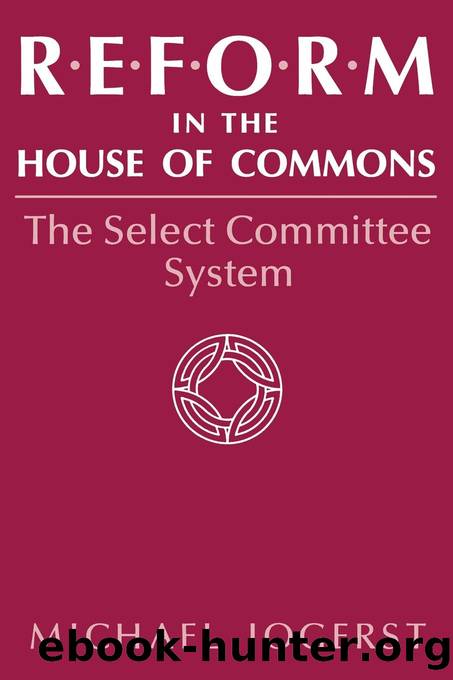Reform in the House of Commons by Jogerst Michael;

Author:Jogerst, Michael; [Jogerst, Michael]
Language: eng
Format: epub
Publisher: University Press of Kentucky
Published: 2021-08-15T00:00:00+00:00
6
Defining the Role of a Member of Parliament
The preceding chapter highlighted the political realities of parliamentary reform: executive reluctance to strengthen legislative investigatory bodies, committee membersâ frustrations with imposed limitations in conducting inquiries, Procedure Committee assumptions about the proper role and powers of select committees in a parliamentary system, and changing orientations of MPs toward their roles as legislators. The Procedure Committeeâs report of 1978 was all the more pathbreaking because of what it expected of members of Parliament. For the proposed committee system to be successful, effective, or relevant, membersâ attitudes about their jobs, about Parliament, and about committee service necessarily had to differ from the assumptions predicated in previous Procedure Committee reports.
The committeeâs belief that the requisite attitudinal changes had indeed occurred, that MPs were in some ways different from those of, say, twenty years before, was supported by various behavioral evidence. Committee members were aware of the unprecedented backbench dissent and rebellion in the 1960s and 1970s. They noted the increased calls for more staff and better resources, particularly by, but not limited to, recent entrants. They monitored the attempts of the then current committees to pursue broader, policy-related inquiries. And they took evidence from clerks, academics, and MPs who charged that while Parliament had apparently abdicated its constitutional role of accountability in recent years, members were seeking to âclaw backâ this power they had lost.
The Procedure Committeeâs report raised high expectations for the proposed departmentally related select committees. The new committees were to monitor, scrutinize, and influence government policies and their administration. They were to be the âeyes and earsâ of the House in its relation with government departments. Furthermore, the select committees were expected to be able to respond quickly to current problems as well as maintain long-term oversight of expenditure programs of their respective departments. The result, Procedure Committee members hoped, would entail greater participation and influence in the parliamentary process by backbenchers, increased accountability of the Executive to the legislature, better information access to members of Parliament, and of course a reassertion of the Houseâs role in policy formation and evaluation. To achieve these desired aims, the onus of responsibility would fall to the members of the new committees. Although the necessary institutional structures were created, they would remain relatively ineffectual without a corresponding interest, dedication, and will among their members. For the new system to be successful, the backbenchers seeking places on the committees would need to possess attitudes commensurate with those expected and anticipated in the Procedure Committeeâs report.
Awareness of the attitudes of legislators toward their roles in the legislature and their motivations and goals in the assembly assist one in deciphering how and why these members may react to or interpret various political phenomena. In this case, for example, knowing an MPâs attitude about his or her role in the House, the emphasis placed on specialization, policy making, scrutinizing the Executive, and party loyalty provides a useful profile of the âtypeâ of MP he or she best fits. Does one
Download
This site does not store any files on its server. We only index and link to content provided by other sites. Please contact the content providers to delete copyright contents if any and email us, we'll remove relevant links or contents immediately.
The Secret History by Donna Tartt(19052)
The Social Justice Warrior Handbook by Lisa De Pasquale(12187)
Thirteen Reasons Why by Jay Asher(8893)
This Is How You Lose Her by Junot Diaz(6877)
Weapons of Math Destruction by Cathy O'Neil(6265)
Zero to One by Peter Thiel(5786)
Beartown by Fredrik Backman(5737)
The Myth of the Strong Leader by Archie Brown(5499)
The Fire Next Time by James Baldwin(5431)
How Democracies Die by Steven Levitsky & Daniel Ziblatt(5215)
Promise Me, Dad by Joe Biden(5141)
Stone's Rules by Roger Stone(5081)
A Higher Loyalty: Truth, Lies, and Leadership by James Comey(4954)
100 Deadly Skills by Clint Emerson(4921)
Rise and Kill First by Ronen Bergman(4779)
Secrecy World by Jake Bernstein(4741)
The David Icke Guide to the Global Conspiracy (and how to end it) by David Icke(4707)
The Farm by Tom Rob Smith(4502)
The Doomsday Machine by Daniel Ellsberg(4484)
